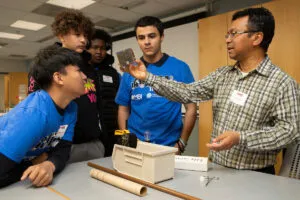Christina Santana: Showing up authentically as a collaborator
 Associate Professor of English, 2020 Alden Award Winner
Associate Professor of English, 2020 Alden Award Winner
Midway through Christina Santana’s college education, she received a piece of advice from her first mentor, an architecture professor. She went to him after a frustrating experience giving a presentation to a different faculty member who had not understood her work.
Her mentor told her: Teach, don’t defend.
“I still think about that all the time,” she said. “What does it mean to help other people see your vision and to trust yourself in that fuller way?”
Santana eventually changed majors and now is an associate professor of English who teaches writing at Worcester State. She supports students to be public people by teaching professional skills in community writing, grant writing and writing consultancy. She found her way to teaching, she says, because she was interested in relaying ideas effectively (rhetorically) and helping others learn to do the same.
“The way I think about myself as a professional, it’s about being as useful as I can as a collaborator,” she said. “And the fact that I get to design learning spaces and to help students through them is a real joy for me. I always come back to questions like: Is this practical? Is this useful? Is this going to help them in their life somehow? What can they monetize without it being an experience of getting monetized?”
In 2023, Santana was part of an academic team that edited, Anti-racist Community Engagement: Principles and Practices (Campus Compact, 2023), a book that examines how to exemplify anti-racist values in higher education’s community engagement efforts. In part because she was the lead editor and project manager, that work has also had a significant influence on how she approaches teaching.
“It’s influenced the way I think about who gets left out in the classroom and the ways that I used to show up in classrooms and was mostly ignored,” she said. “So inclusivity matters a lot to me. Anti-racism is often on my mind. How I show up as an empowered Afro-Latina professor is really important. And the more authentic I can be as a professional, the more I can continue to have difficult conversations and to make space for them and to validate them, the more students are able to dig deeper and take more risks.”
Success in the classroom, she says, looks like “productively confused students.”
“Those gears are turning and I can see it, and I can be there with them,” Santana said. “I love those moments.”



